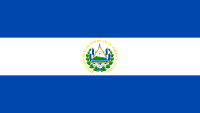 El Salvador (pronounced /ɛl ˈsælvədɔr/; Spanish: República de El Salvador, literally meaning “Republic of the Savior”) is the smallest and also the most densely populated country in Central America. It borders the Pacific Ocean between Guatemala and Honduras. It lies on the Gulf of Fonseca, as do Honduras and Nicaragua further south.
El Salvador (pronounced /ɛl ˈsælvədɔr/; Spanish: República de El Salvador, literally meaning “Republic of the Savior”) is the smallest and also the most densely populated country in Central America. It borders the Pacific Ocean between Guatemala and Honduras. It lies on the Gulf of Fonseca, as do Honduras and Nicaragua further south.
It has a population of approximately 6.1 million people, as of 2009. The capital city of San Salvador is the largest city of the republic. The colón was the currency of El Salvador between 1892 and 2001, when El Salvador adopted the U.S. Dollar. The colón continues to be legal tender.
The Spanish arrived in the area in 1524 and subjugated the Pipil Indian kingdom of Cuzcatlán by 1539. The country was divided into two districts, San Salvador and Sonsonate, both attached to Guatemala. When Spanish rule ended in 1821, the Salvadorans opposed incorporation into the Mexican Empire (confronting both Guatemalan and Mexican armies), and, upon its collapse in 1823, Sonsonate and San Salvador combined to form the new state of El Salvador within the United Provinces of Central America. The country attained independence in 1841.
From its founding, it experienced a high degree of political turmoil; powerful economic interests controlled the country through most of the 19th and early 20th centuries but were replaced by a military dictatorship that lasted from 1931 to 1979. Elections held in 1982 set up a new government, and, though a new constitution was adopted in 1983, civil war continued throughout the 1980s. Peace accords in 1992 ended the war, but violent crime became a major problem. Despite attempts at economic reform, the country was plagued by inflation and unemployment into the 21st century. In 2006 El Salvador officially entered into the Central American Free Trade Agreement (CAFTA) with the United States.
The Catholic Church plays an important role in the Salvadoran culture. Archbishop Oscar Romero is a national hero for his role in speaking out against human rights violations that were occurring in the lead up to the Salvadoran Civil War. Significant foreign personalities in El Salvador were the Jesuit priests and professors Ignacio Ellacuria, Ignacio Martín-Baró, and Segundo Montes, who were murdered in 1989 by the Salvadoran Army during the heat of the civil war.
El Salvador’s economy has traditionally been agricultural, but services and industry now employ a greater percentage of the workforce and account for a much higher percentage of the gross domestic product. El Salvador’s economy was adversely affected by its 12-year civil war. Beginning in the early 1990s, however, attempts were made to revive the country’s economic life, and the economy had recovered by the beginning of 2001, when El Salvador adopted the U.S. dollar as its official currency.
About half of the land is used for either crops or pasturage. Corn is the chief subsistence crop, and rice, beans, oil seeds, and sorghum are also grown; coffee and sugar are the major cash crops. Food and beverage processing is important and petroleum, chemicals, fertilizer, textiles, furniture, and light metals are among El Salvador’s leading manufactures. The Inter-American Highway crosses El Salvador and forms the heart of an excellent transportation system that links San Salvador with the ports of La Unión, Acajutla, and La Libertad and the inland cities of San Miguel and Santa Ana.
Notes from Wikipedia and Answers.com









